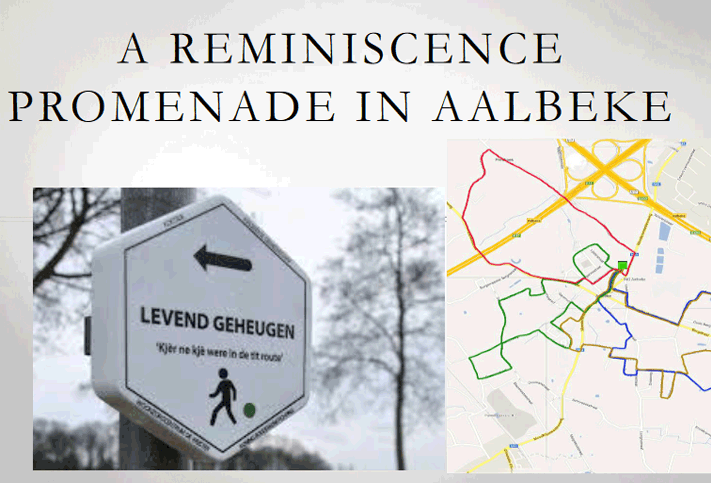
| Short descriptor of good practice |
| The project ‘Reminiscence Promenade’ was created to stimulate reminiscence of the elderly with dementia and enhance their integration into village life. The promenade is public and consists of 4 walks of approximately 5 km’s on the ‘Slow Roads’. Each of four routes has 2 or 3 stops (where benches are provided) referring to past events or buildings, recognizable by Aalbeke residents. They share their knowledge with the elderly with dementia who can relive that event and talk about it. This way, the project strengthens inter-generational support. The promenades were made in collaboration with the local population and organizations. Local history experts helped set up an explanatory guide, and paths were designed wide enough to give access to wheelchairs or buggies. Expertise Centre Dementia (ECD) organized educational programs so people can understand the symptoms of dementia and the meaning of the reminiscence promenade. |
| Type of setting where good practice is delivered |
| The practice is carried out in the willage of Aalbeke, in cooperation with nursing home De Weister, city of Kortrijk and Expertise Centre Dementia Sophia (ECD). |
| Time Frame for delivery of good practice |
| It is a regular outdoor public activity supporting integration of the elderly with dementia and intergenerational contact. |
| Type of learner the best practice is supporting |
| It supports the elderly with dementia, but also educates all citizens in order to de-stigmatize illness. |
| Resources used as part of good practice |
| https://www.ccre.org/bibliotheques/getFile/1f6a3865bf69233b45b83db56ad05a0e45127261 |
| Aims and objectives of good practice |
| The specific project objectives are: · To stimulate reminiscence of the elderly with dementia · To enhance inter-generational work · To improve accessibility and mobility · To educate people on the symptoms of dementia, and thus help people with dementia to be integrated and de-stigmatized |
| Evidence as to why this was considered good practice |
| The project received European Foundation’ Initiative on Dementia Award (EFID) in 2014. |
| 3 Key learning Principles that were used in this good practice to support senior learners |
| 1. Respectful Environment: creating a supportive learning environment is crucial, because it helps adults with dementia to feel excepted and comfortable among other citizens 2. Active Engagement: promote active participation and involvement of both people with dementia and local citizens of all age, fostering interactions and integration. 3. Problem-Centered Approach: educational activities should reduce prejudices that people have on dementia. |
| Any additional learning that we can take from this good practice example |
| Educational programs were organized for people to understand the symptoms of dementia and the meaning of the reminiscence promenade. |
| Any Additional Information |
| / |
